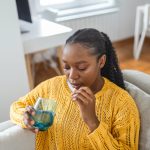Table of Contents
Anxiety is one of the most common mental health challenges, affecting focus, decision-making, and overall cognitive performance. It can make even simple tasks feel overwhelming, leaving individuals searching for effective ways to regain clarity and calmness.
Nootropics, often referred to as “smart drugs,” are substances designed to enhance brain function. Beyond improving memory and focus, certain nootropics have shown promise in reducing anxiety and promoting relaxation without sedation.
This article explores the best nootropics for managing anxiety, their mechanisms of action, and how they can help restore mental clarity and emotional balance. Whether you’re dealing with daily stress or more persistent anxiety, discovering the right nootropic could offer a natural and effective solution.
Understanding Anxiety and Its Effects on the Brain
Anxiety is a natural response to stress, but when it becomes persistent or overwhelming, it can significantly impact cognitive function and overall well-being. Understanding how anxiety affects the brain provides insight into how nootropics can help manage its symptoms.
How Anxiety Impacts the Brain
- Overactive Stress Response
Anxiety triggers the fight-or-flight response, releasing stress hormones like cortisol. Prolonged activation of this response can impair focus, memory, and decision-making. - Neurotransmitter Imbalance
Anxiety often involves an imbalance of key neurotransmitters, such as:- GABA: Low levels of this inhibitory neurotransmitter can lead to hyperactivity in the brain, causing restlessness and worry.
- Serotonin: Deficiency in serotonin is linked to mood instability and heightened anxiety.
- Dopamine: Imbalances can reduce motivation and increase feelings of unease.
- Cognitive Effects
Chronic anxiety can lead to:- Mental Fog: Difficulty concentrating or processing information.
- Memory Impairment: Reduced ability to recall or retain information.
- Poor Decision-Making: Increased difficulty evaluating options or taking action.
How Nootropics Can Help
Nootropics interact with the brain’s chemistry to alleviate anxiety and its effects on cognition by:
- Enhancing neurotransmitter activity, such as increasing GABA or serotonin levels.
- Reducing cortisol and promoting a calmer, more balanced mental state.
- Supporting neural health and improving focus, memory, and decision-making even under stress.
By addressing the root causes of anxiety, nootropics provide a holistic approach to managing its symptoms while also improving cognitive performance. In the following sections, we’ll explore criteria for selecting the right nootropics and the best options for anxiety relief.
Criteria for Choosing Nootropics for Anxiety
Selecting the right nootropic for managing anxiety requires careful consideration of its effects, safety, and compatibility with your specific needs. The following criteria can help identify nootropics that reduce anxiety while supporting overall cognitive performance.
Promotes Relaxation Without Sedation
The ideal nootropic for anxiety helps calm the mind without causing drowsiness or impairing productivity. This is particularly important for individuals who want to remain focused and alert while managing stress.
Reduces Stress and Improves Resilience
Effective nootropics for anxiety help lower cortisol levels, the primary stress hormone, while enhancing the brain’s ability to cope with challenging situations. Adaptogens like Ashwagandha are especially beneficial for improving stress resilience.
Enhances Mood and Cognitive Clarity
Anxiety often disrupts mood and mental clarity. Nootropics that stabilize mood and support neurotransmitter balance can provide a calming effect while improving focus and decision-making. Omega-3 fatty acids, for example, support serotonin function to improve mood and reduce anxiety symptoms.
Evidence-Based and Safe
Safety is a critical factor when choosing a nootropic for anxiety. Look for well-researched options with minimal side effects. Natural nootropics like Rhodiola Rosea, Bacopa Monnieri, and magnesium are supported by studies demonstrating their efficacy and safety in managing anxiety.
Long-Term Brain Support
Some nootropics provide not only immediate anxiety relief but also long-term support for brain health. For example, Lion’s Mane Mushroom supports neurogenesis and brain repair, which can indirectly help alleviate anxiety over time.
Key Attributes of the Best Nootropics for Anxiety
- Relaxation without sedation.
- Stress reduction and resilience.
- Mood stabilization and cognitive clarity.
- Proven safety through research.
- Long-term benefits for brain health.
By focusing on these criteria, you can select nootropics that address anxiety effectively while enhancing overall mental performance. In the next section, we’ll dive into the specific nootropics that meet these standards.
Best Nootropics for Anxiety
The following nootropics are highly effective for managing anxiety. They promote relaxation, enhance mood, and improve cognitive clarity without compromising energy or focus. Each offers unique benefits backed by research and practical applications.
1. L-Theanine
Benefits
- Promotes relaxation without causing drowsiness.
- Reduces cortisol levels and improves focus when paired with caffeine.
- Calms the mind by increasing alpha brain wave activity.
Mechanism
L-theanine, an amino acid found in tea, enhances GABA activity and modulates neurotransmitters like serotonin and dopamine. This combination reduces anxiety while maintaining alertness.
Usage
Take 100–200 mg as needed, alone or with caffeine for balanced focus.
2. Ashwagandha
Benefits
- Reduces cortisol levels and enhances resilience to stress.
- Improves mood and supports emotional stability.
- Boosts energy levels, making it ideal for combating stress-induced fatigue.
Mechanism
As an adaptogen, Ashwagandha regulates the hypothalamic-pituitary-adrenal (HPA) axis, reducing stress hormone production and promoting balance in the body.
Usage
Take 300–600 mg of a high-quality extract daily.
3. Bacopa Monnieri

Benefits
- Enhances memory and cognitive function while reducing stress.
- Stabilizes mood by modulating serotonin and dopamine levels.
- Offers neuroprotective effects for long-term brain health.
Mechanism
Bacopa Monnieri works by improving synaptic communication and protecting neurons from oxidative stress, which helps reduce the cognitive effects of anxiety.
Usage
Take 300–500 mg daily, preferably with food.
4. Rhodiola Rosea

Benefits
- Improves mental and physical resilience to stress.
- Reduces fatigue and enhances focus under pressure.
- Promotes a sense of calm during high-stress situations.
Mechanism
Rhodiola Rosea increases serotonin activity and supports the balance of stress-response systems in the brain, helping to combat anxiety and burnout.
Usage
Take 200–400 mg daily, with a standardized extract containing rosavins and salidrosides.
5. Omega-3 Fatty Acids

Benefits
- Supports brain health and reduces symptoms of anxiety and depression.
- Promotes serotonin function and reduces inflammation in the brain.
- Improves mood and cognitive clarity over time.
Mechanism
DHA and EPA, the key components of omega-3s, regulate neurotransmitter pathways and reduce inflammation associated with stress and anxiety.
Usage
Take 1,000–2,000 mg of a high-quality fish oil supplement daily.
6. Natural Nicotine

Benefits
- Enhances focus and reduces mental fog associated with anxiety.
- Provides cognitive clarity without sedative effects.
Mechanism
Natural nicotine stimulates acetylcholine receptors, improving focus and mental sharpness. Controlled products like Nic Nac Naturals minimize risks by offering precise, low doses.
Usage
Use controlled-dose lozenges as directed, ensuring moderation and consulting a healthcare provider.
7. Magnesium L-Threonate

Benefits
- Reduces anxiety by calming overactive brain activity.
- Supports GABA and serotonin neurotransmitters for relaxation.
Mechanism
Magnesium L-Threonate crosses the blood-brain barrier effectively, regulating brain activity and reducing anxiety symptoms.
Usage
Take 1,500–2,000 mg daily, split into two doses.
8. Lion’s Mane Mushroom

Benefits
- Promotes neurogenesis and brain repair, indirectly reducing anxiety.
- Improves focus, memory, and mental clarity over time.
Mechanism
Lion’s Mane stimulates the production of nerve growth factor (NGF), supporting neural health and reducing stress-related cognitive decline.
Usage
Take 500–1,000 mg daily as part of a balanced routine.
Nootropics to Avoid for Anxiety

While many nootropics are effective for managing anxiety, certain substances can exacerbate symptoms or introduce unwanted side effects. It’s essential to avoid these nootropics if you’re prone to anxiety or looking to reduce stress.
1. High Doses of Caffeine
Why to Avoid:
- Excessive caffeine intake can overstimulate the nervous system, increasing feelings of restlessness, irritability, and anxiety.
- High doses may cause insomnia and rapid heart rate, further exacerbating anxiety symptoms.
Recommendation:
Stick to moderate amounts (under 200 mg daily) or pair caffeine with L-theanine to reduce its stimulating effects.
2. Synthetic Stimulants
Some examples are Modafinil, Adderall, and other amphetamine-based stimulants.
Why to Avoid:
- These stimulants increase dopamine and norepinephrine, potentially triggering overstimulation and heightened anxiety.
- They may also disrupt sleep patterns, a critical factor in managing stress and anxiety.
Recommendation:
Avoid using synthetic stimulants unless prescribed by a healthcare provider, and explore natural alternatives like Rhodiola Rosea or L-theanine.
3. Unregulated Supplements
Why to Avoid:
- Some nootropics sold online may lack safety data, proper labeling, or regulatory approval.
- Unknown ingredients or impurities could negatively impact mental health and increase anxiety.
Recommendation:
Purchase supplements from trusted, research-backed brands with transparent labeling and clinical studies.
4. Nootropics That Strongly Affect Serotonin Levels
Some examples are St. John’s Wort and 5-HTP.
Why to Avoid:
- These nootropics can increase serotonin levels excessively, potentially leading to serotonin syndrome, a dangerous condition characterized by agitation, confusion, and rapid heart rate.
Recommendation:
Use caution when combining serotonin-affecting nootropics with other medications, such as antidepressants, and consult a healthcare provider.
5. High-Risk Synthetic Nootropics
Examples: Racetams like Piracetam and Aniracetam.
Why to Avoid:
- While not inherently anxiety-inducing, their long-term safety profile is unclear, and they may not directly address anxiety.
- Some users report overstimulation or mood disturbances.
Recommendation:
Focus on natural nootropics with proven anxiety-reducing benefits.
Key Takeaway
Avoid high-stimulant and poorly regulated nootropics, as they can increase anxiety and stress. Instead, prioritize natural, evidence-backed options like L-theanine, Ashwagandha, and Omega-3 fatty acids for safe and effective anxiety management.
How to Incorporate Nootropics into an Anxiety-Relief Routine
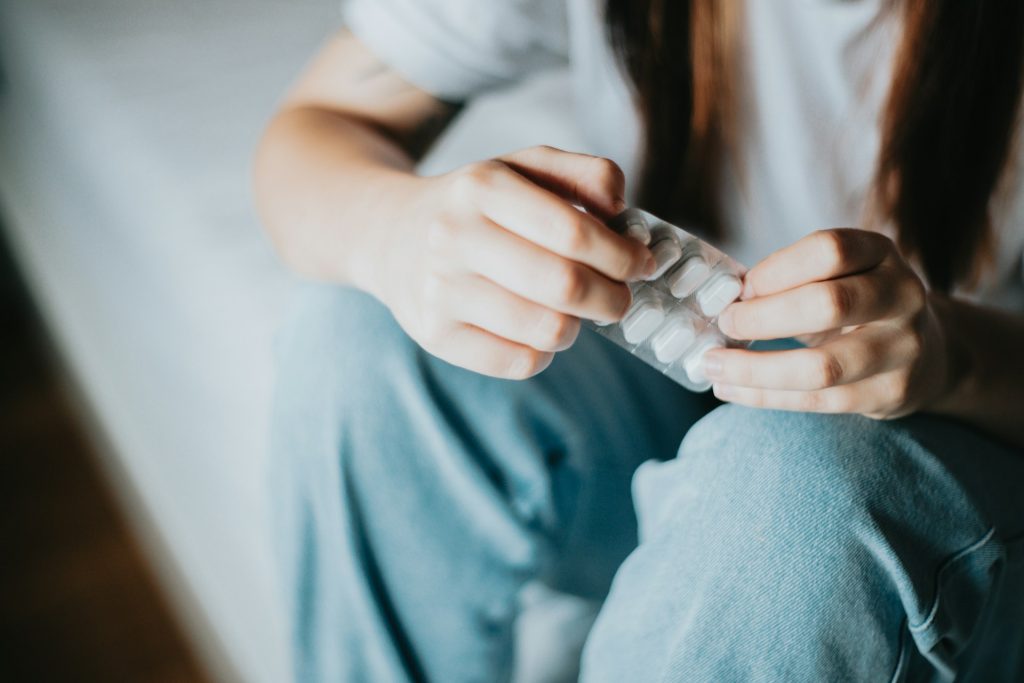
Integrating nootropics into your daily routine can significantly improve your ability to manage anxiety while enhancing cognitive performance. However, the key to success lies in using them strategically and combining them with supportive lifestyle habits.
1. Start with Low Doses and Monitor Response
- Introduce one nootropic at a time to evaluate its effects on your body and mind.
- Begin with the lowest recommended dose, then gradually increase if needed, while paying attention to how your anxiety symptoms respond.
- Track changes in mood, focus, and physical sensations to identify what works best for you.
2. Prioritize Timing and Dosage
- Use nootropics during times of peak stress or when anxiety tends to be most disruptive (e.g., before a presentation or during a high-pressure task).
- Take L-theanine in the morning or early afternoon to maintain calm focus throughout the day.
- Use Magnesium L-Threonate in the evening to promote relaxation and better sleep.
3. Combine Nootropics for Synergistic Effects
Certain nootropics work well together, enhancing their individual benefits. For example:
- L-theanine + Caffeine: Calms the nervous system while maintaining focus and energy.
- Ashwagandha + Bacopa Monnieri: Reduces cortisol and enhances stress resilience while supporting memory and mood.
4. Integrate with Lifestyle Changes
Nootropics are most effective when combined with healthy habits that support mental and physical well-being:
- Mindfulness and Meditation: Practices like deep breathing or guided meditation can amplify the anxiety-reducing effects of nootropics like GABA or Ashwagandha.
- Regular Exercise: Physical activity reduces cortisol levels and improves endorphin production, complementing nootropics like Rhodiola Rosea.
- Balanced Diet: Consuming foods rich in omega-3 fatty acids, magnesium, and antioxidants can enhance the effects of nootropics.
5. Use Trusted, Research-Backed Products
- Choose high-quality, well-researched supplements from reputable brands.
- For natural nicotine, opt for controlled products like Nic Nac Naturals to ensure safe dosing and effective anxiety management.
6. Establish a Routine for Consistency
- Create a daily schedule for taking your nootropics, integrating them seamlessly into your morning, afternoon, or evening routines.
- Consistency allows your body to adapt and maximize the benefits of each supplement.
Example Daily Routine for Anxiety Management
- Morning: Start with L-theanine and caffeine to maintain calm focus.
- Midday: Take Ashwagandha to manage stress levels during peak activity.
- Evening: Use Magnesium L-Threonate or GABA to unwind and prepare for restful sleep.
By incorporating nootropics thoughtfully and combining them with supportive lifestyle practices, you can create an effective routine to manage anxiety while optimizing your mental clarity and resilience.
Benefits of Nootropics for Anxiety
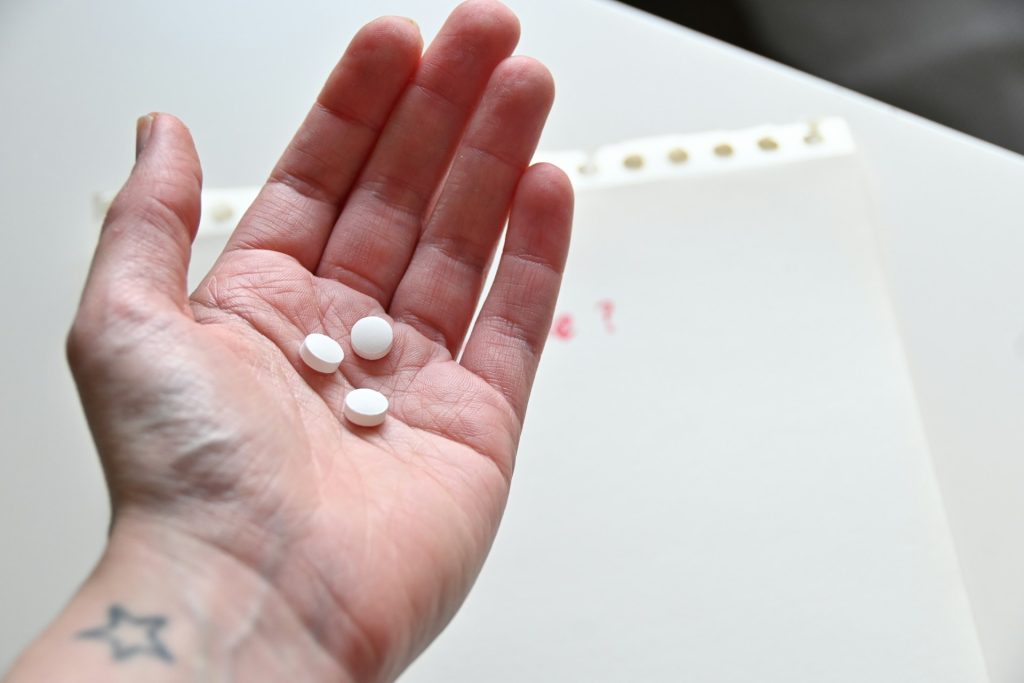
Nootropics offer a range of benefits for individuals managing anxiety. By supporting brain health and balancing neurotransmitters, they address both the emotional and cognitive aspects of anxiety, enhancing overall mental performance and well-being.
1. Improved Focus and Productivity
Anxiety often leads to distraction and difficulty concentrating, making it hard to stay productive. Nootropics like L-theanine and natural nicotine enhance focus by calming overactive thoughts while maintaining mental clarity. L-theanine reduces cortisol levels and promotes alpha brain wave activity, which is associated with relaxed focus.
2. Enhanced Mood Stability
Nootropics can help stabilize mood by supporting key neurotransmitters like serotonin and dopamine. This reduces feelings of unease and promotes emotional resilience. Ashwagandha lowers cortisol and improves serotonin activity, helping manage stress-related mood swings. Omega-3 fatty acids support serotonin function, improving emotional balance.
3. Reduced Physical Symptoms of Anxiety
Physical manifestations of anxiety, such as rapid heartbeat or muscle tension, can be alleviated by certain nootropics. Magnesium L-Threonate helps relax muscles and calm the nervous system. Rhodiola Rosea reduces fatigue and physical stress responses.
4. Better Cognitive Clarity
Chronic anxiety can cause mental fog and impair memory. Nootropics that enhance neurogenesis or protect against oxidative stress can restore mental sharpness.Lion’s Mane Mushroom promotes neural repair, improving memory and cognitive clarity over time. Bacopa Monnieri supports synaptic communication and enhances recall.
5. Long-Term Brain Support
In addition to providing immediate relief, nootropics can offer long-term benefits by promoting neural health and resilience. Omega-3 fatty acids and Lion’s Mane protect against neurodegeneration and support brain plasticity, helping prevent cognitive decline associated with chronic stress.
By addressing the root causes and symptoms of anxiety, nootropics provide a holistic approach to stress management while improving cognitive and emotional performance. These benefits make them an effective tool for anyone seeking to manage anxiety naturally and sustainably.
How Nootropics Support Neurotransmitter Balance
Anxiety often stems from imbalances in key neurotransmitters that regulate mood, stress response, and mental clarity. Nootropics address these imbalances by enhancing or stabilizing the activity of these brain chemicals, providing relief from anxiety symptoms.
GABA (Gamma-Aminobutyric Acid)
- Role: GABA is the brain’s primary inhibitory neurotransmitter, responsible for calming neural activity. Low GABA levels are linked to heightened anxiety and restlessness.
- Nootropics: Supplements like Magnesium L-Threonate and direct GABA supplementation increase GABA activity, reducing overactive brain signals and promoting relaxation.
Serotonin
- Role: This neurotransmitter regulates mood and emotional stability. Low serotonin levels are commonly associated with anxiety and depression.
- Nootropics: Ashwagandha and Bacopa Monnieri help modulate serotonin production, promoting emotional balance.
Dopamine
- Role: Dopamine plays a critical role in motivation and pleasure. Imbalances can lead to feelings of unease and difficulty focusing.
- Nootropics: Controlled products like Nic Nac Naturals and adaptogens like Rhodiola Rosea boost dopamine activity, improving focus and reducing mental tension.
By targeting these neurotransmitters, nootropics provide a dual benefit: reducing anxiety symptoms while enhancing cognitive function.
The Science Behind Adaptogens and Anxiety Relief
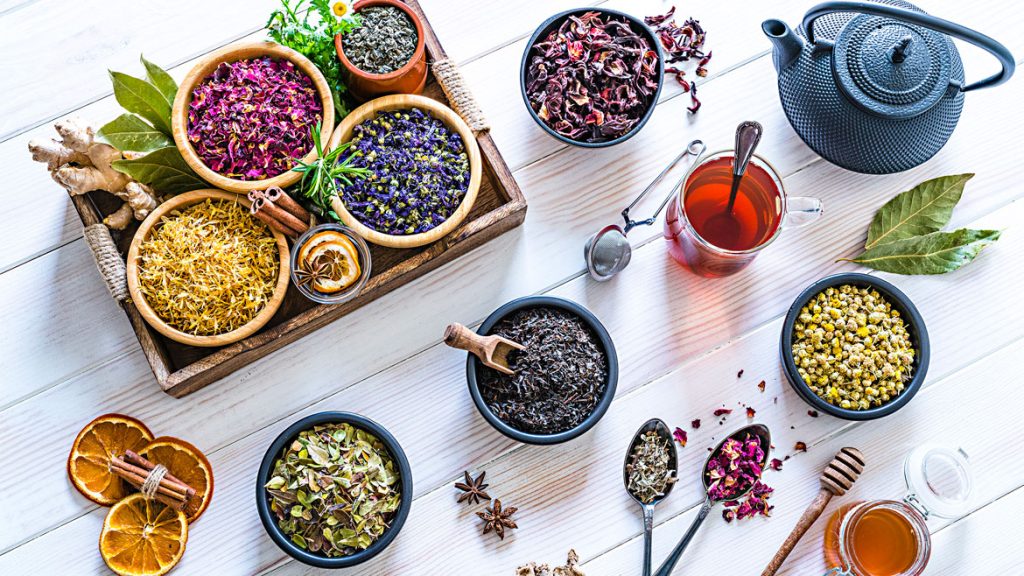
Adaptogens are a class of natural substances that help the body adapt to stress, making them particularly effective for managing anxiety. Their unique mechanisms allow them to modulate the body’s stress response without causing sedation, offering both mental and physical resilience.
How Adaptogens Work
Adaptogens interact with the hypothalamic-pituitary-adrenal (HPA) axis, the system responsible for managing stress. By regulating cortisol production and improving the brain’s response to stress, they help maintain balance even under challenging circumstances.
Top Adaptogens for Anxiety
- Ashwagandha: Reduces cortisol levels, improves sleep quality, and stabilizes mood. Its ability to lower the physiological impact of stress makes it a favorite among those seeking anxiety relief.
- Rhodiola Rosea: Enhances mental resilience and combats fatigue, particularly in high-pressure situations. It supports serotonin and dopamine pathways, improving emotional stability.
- Holy Basil (Tulsi): Helps reduce the physical symptoms of stress, such as inflammation and fatigue, while promoting a calm state of mind.
Benefits of Adaptogens
Adaptogens not only relieve anxiety but also enhance energy, focus, and cognitive performance. They provide a natural, long-term solution for managing stress and improving mental health without the risks of dependence or side effects.
Combining Nootropics with Lifestyle Practices for Anxiety Relief
While nootropics can be highly effective in managing anxiety, their benefits are amplified when paired with healthy lifestyle practices. A comprehensive approach that includes physical activity, mindfulness, and a balanced diet can enhance the calming and cognitive-boosting effects of nootropics.
1. Physical Activity
Regular exercise reduces anxiety by lowering cortisol levels and increasing endorphin production, which promotes a sense of well-being. Activities like yoga and aerobic exercise also improve blood flow to the brain, enhancing the effects of nootropics like Rhodiola Rosea and Omega-3 fatty acids.
Example: Combining a morning workout with a nootropic like L-theanine can set a calm, focused tone for the day.
2. Mindfulness and Meditation
Mindfulness practices, such as meditation and deep breathing, calm the mind and regulate the body’s stress response. These practices complement nootropics like GABA and Ashwagandha, which work to stabilize mood and reduce overactive brain activity.
Practical Tip: Incorporate a brief mindfulness session after taking nootropics to maximize their anxiety-reducing effects.
3. Nutrition
A brain-healthy diet rich in omega-3 fatty acids, magnesium, and antioxidants supports overall mental health and reduces stress. Foods like fatty fish, nuts, leafy greens, and berries provide essential nutrients that enhance the efficacy of nootropics like Magnesium L-Threonate and Lion’s Mane Mushroom.
Example: Pairing a magnesium supplement with a meal of salmon and spinach can improve both mood and cognitive clarity.
4. Sleep Hygiene
Good sleep is essential for managing anxiety, and certain nootropics like Magnesium L-Threonate and GABA can help improve sleep quality. Pairing these supplements with a consistent bedtime routine can enhance relaxation and support mental resilience.
By integrating these lifestyle practices with nootropics, individuals can create a holistic anxiety management plan that promotes long-term well-being and mental clarity. This balanced approach ensures sustainable results while minimizing reliance on supplements.
Conclusion
Nootropics can be a valuable tool for managing anxiety, offering benefits such as improved focus, emotional balance, and cognitive clarity. From calming agents like L-theanine to adaptogens like Ashwagandha and neuroprotectors like Lion’s Mane Mushroom, these substances target the root causes of anxiety while enhancing mental performance.
While most natural nootropics carry minimal risks, responsible use is crucial. Start with low doses, prioritize evidence-backed options, and integrate them into a holistic routine that includes mindfulness, exercise, and a healthy diet. Always consult a healthcare provider for personalized advice, especially if you’re using other medications.
For those seeking controlled, safe solutions, explore research-backed products like Nic Nac Naturals, designed to deliver cognitive benefits responsibly. With the right approach, nootropics can help you overcome anxiety and unlock greater mental clarity and resilience.

Hi, Dave Michaelson here, a longtime biohacker. I started this blog to help you focus on natural ways to improve health and performance. My work revolves around analyzing the science behind cognitive enhancers, nutrition, and longevity strategies. Natural nicotine products are one of my interests, particularly their effects on focus and energy. Everything I share is based on research and real-world application, ensuring practical, reliable insights. The information on my blog is not medical advice. Please do your own research.

